
Journal of Economic Sociology-Ekonomicheskaya Sotsiologiya
Scope & Guideline
Unraveling the Complex Ties Between Society and Economics
Introduction
Aims and Scopes
- Economic Inequality and Social Justice:
The journal emphasizes research on income inequality, its determinants, and implications for social justice, exploring various dimensions such as gender, race, and class. - Political and Economic Structures:
There is a strong focus on the analysis of political frameworks and their effects on economic outcomes, including studies on economic freedom, governance, and policy impacts. - Cultural and Social Influences on Economic Behavior:
Research examining how cultural factors and social norms impact economic behaviors and decisions is a core area, highlighting the interplay between culture and economy. - Environmental Economics and Sustainability:
The journal addresses issues related to environmental performance, climate change, and sustainable practices, integrating sociological insights with economic policies. - Migration and Labor Dynamics:
A significant area of research involves labor migration, family strategies, and the socio-economic implications of these movements in various cultural contexts. - Digital Economy and Technological Impact:
The journal explores the ramifications of digitalization on economic structures, corporate performance, and social equity, particularly in emerging economies.
Trending and Emerging
- Digital Financial Inclusion:
Recent studies focus on how digital technologies enhance financial inclusion, especially in rural and underserved communities, highlighting the intersection of technology and social equity. - Impact of Climate Change on Economic Systems:
There is a growing emphasis on the socio-economic impacts of climate change, including research on sustainability practices and the role of civil society in climate action. - Health Economics and Social Determinants:
Emerging themes explore the relationship between economic conditions and health outcomes, particularly in the context of the COVID-19 pandemic and its socio-economic repercussions. - Gender and Economic Exploitation:
An increasing number of papers address issues of gender inequality and exploitation in economic systems, reflecting a heightened awareness of social justice concerns. - Cross-Border Economic Issues:
Research on the implications of cross-border policies and international economic relations is gaining traction, particularly in light of globalization and transnational movements.
Declining or Waning
- Historical Economic Analysis:
Research focusing on historical economic events, such as colonialism or past economic policies, appears to be less prevalent, possibly overshadowed by contemporary issues. - Traditional Labor Studies:
Studies centered on conventional labor dynamics and employment relations have diminished, as newer themes like gig economy and digital labor take precedence. - Mainstream Economic Theories:
There seems to be a decline in interest towards traditional economic theories that do not incorporate sociological perspectives, as interdisciplinary approaches gain traction. - Single-Dimensional Economic Policies:
Research that examines economic policies in isolation, without considering sociocultural or political contexts, is becoming less common, indicating a shift towards more integrated analyses. - Rural Economic Studies:
While rural economics has been a topic of interest, it is currently less emphasized compared to urban economic issues and their sociological implications.
Similar Journals

Global Economic Review
Connecting scholars with vital economic research.Global Economic Review, published by ROUTLEDGE JOURNALS, TAYLOR & FRANCIS LTD, is a pivotal academic journal that serves the fields of Business, International Management, Economics, Econometrics, and Political Science. With an ISSN of 1226-508X and an E-ISSN of 1744-3873, this esteemed journal has been disseminating vital economic research since 1996, and is set to continue until 2024. The journal holds a notable presence in academic circles, achieving a Q3 quartile ranking in the 2023 category assessments across various disciplines, including Business and International Management, Economics, and Political Science. Notably, it ranks in the top 60th percentile for Political Science and International Relations, showcasing its significant contribution to the discourse within the social sciences. Although not an open-access publication, the Global Economic Review remains accessible to a wide range of researchers, professionals, and students, acting as a critical platform for innovative and impactful economic ideas. Its rigorous peer-review process ensures the publication of high-quality research that responds to the challenges of a rapidly evolving global economy. Scholars seeking to engage with pertinent economic issues will find this journal to be an invaluable resource.

Chinese Journal of Sociology
Illuminating Contemporary Social Structures and Behaviors.The Chinese Journal of Sociology, published by SAGE Publications Ltd, is a leading venue for research in the field of sociology, with a focus on contemporary social issues within and beyond China. Since its establishment in 2015, the journal has gained a reputation for its rigorous peer-reviewed articles, contributing significantly to scholarly discourse and understanding of social dynamics in a rapidly changing world. With an impressive Q2 category ranking in Social Sciences and a solid Scopus rank of #111 out of 275, it serves as an essential resource for researchers, professionals, and students keen to explore the complexities of social structures and behaviors. Although not an open access journal, it offers access to a wealth of knowledge and insights, underlining its importance in the academic community. Located in the United Kingdom, the journal strives to foster interdisciplinary collaborations and highlight diverse perspectives, making it an invaluable platform for social science scholarship dedicated to advancing our understanding of the societal landscape.
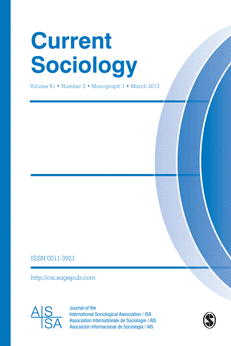
CURRENT SOCIOLOGY
Empowering Scholars to Shape Sociological DiscourseCURRENT SOCIOLOGY is a prestigious academic journal published by SAGE PUBLICATIONS LTD, focusing on the dynamic field of sociology. Since its inception in 1952, this journal has been at the forefront of sociological research, bridging theoretical frameworks and empirical studies to address contemporary social issues. As evidenced by its impressive impact factor and notable ranking among the top Q1 journals in Sociology and Political Science, CURRENT SOCIOLOGY is recognized for its quality and contribution to the academic community, holding a commendable position within the 87th percentile of its discipline—#183 out of 1466 in the Scopus ranks. The journal's scope encompasses a wide range of sociological topics, providing a platform for researchers, professionals, and students to share their insights and foster discussions that shape our understanding of societal dynamics. While it does not currently offer open access, its rich repository of knowledge makes it a vital resource for those eager to explore cutting-edge sociological theories and findings.

Constitutional Political Economy
Unraveling the Complex Ties Between Constitutions and Political EconomyConstitutional Political Economy, published by Springer, is a leading journal in the interdisciplinary field that examines the relationship between constitutional frameworks and economic behavior. With its ISSN 1043-4062 and E-ISSN 1572-9966, the journal has established itself as a significant contributor to discussions in Economics, Law, Philosophy, and Sociology and Political Science, ranking impressively across multiple categories with an impact factor that reflects its scholarly influence: Q3 in Economics and Econometrics, Q2 in Law, Q1 in Philosophy, and Q2 in Sociology and Political Science as of 2023. The journal's scope encompasses theoretical and empirical research that informs the intersections of constitutions and political economy from a variety of perspectives. Published continuously since 1990, it invites contributions from researchers, professionals, and students keen on exploring how constitutional principles shape economic policies and societal outcomes. Although it does not currently offer Open Access options, the insights gleaned from its articles are vital for any academic or practitioner interested in the role of governance in economic systems.
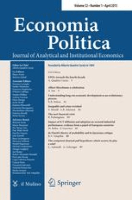
Economia Politica
Bridging Economics, Sociology, and Political ScienceEconomia Politica, published by SPRINGER INT PUBL AG, is a prestigious academic journal based in Switzerland, focusing on the intersection of economics, finance, sociology, and political science. With an impressive 2023 impact factor reflected in its Q2 and Q1 quartile rankings, the journal ranks #295 out of 1466 in Sociology and Political Science and #228 out of 716 in Economics and Econometrics category, highlighting its significance in the field. Spanning over a collaborative history from 2008 to 2024, the journal aims to foster scholarly dialogue and disseminate impactful research that contributes to the understanding of economic and political phenomena. Researchers and professionals interested in comprehensive analyses and innovative studies are encouraged to engage with its rigorous content, which remains a critical resource for advancing knowledge in socio-economic policies and frameworks.
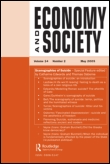
ECONOMY AND SOCIETY
Pioneering Research for a Sustainable SocietyECONOMY AND SOCIETY, published by Routledge Journals, Taylor & Francis Ltd, is a premier academic journal that bridges the realms of economics and social sciences, making significant contributions to interdisciplinary scholarship. Established in 1972 and ongoing through 2024, this journal holds an esteemed Q1 ranking in multiple categories, including Business and International Management, Economics and Econometrics, and History, underscoring its impact within academia. With Scopus rankings placing it in the top percentiles across various fields, ECONOMY AND SOCIETY serves as an essential platform for researchers, professionals, and students to explore critical topics such as economic behavior, societal structures, and historical contexts. Although it does not offer Open Access, its rigorous peer-reviewed articles are instrumental in influencing policy and fostering scholarly dialogue. Explore the full range of issues and contribute to this vibrant academic community focused on the intersection of economy and society.

Perspectives on Global Development and Technology
Shaping Tomorrow's Policies through Rigorous InquiryPerspectives on Global Development and Technology, published by BRILL in the Netherlands, is a pivotal journal that serves as a platform for interdisciplinary research focusing on the intersections of global development and technological advancements. With a diverse scope covering areas like Development, Education, Geography, Health, and Political Science, this journal has established a significant presence in the academic community since its inception in 2002. Although currently not an Open Access journal, it is indexed in prestigious databases such as Scopus, which ranks it within the top percentiles for various social science categories, underscoring its relevance and authority in its field. The journal's commitment to fostering knowledge exchange is evident in its rigorous peer-review process, which ensures the publication of high-quality research that resonates with scholars, practitioners, and policymakers alike. By contributing valuable insights into pressing global issues, Perspectives on Global Development and Technology plays a crucial role in shaping discussions around sustainable development and technological impact on society.
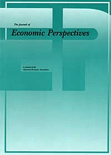
JOURNAL OF ECONOMIC PERSPECTIVES
Unveiling Perspectives that Shape Economic DiscourseJOURNAL OF ECONOMIC PERSPECTIVES, published by the American Economic Association, is a leading academic journal that serves as a vital resource for researchers, professionals, and students in the fields of economics and econometrics. With an impressive impact factor, it ranks in the top Q1 quartile according to the 2023 statistics, demonstrating its significant influence and contribution to the discipline, particularly with a notable Scopus Rank of #21 out of 716 in the category of Economics and Econometrics. Spanning from 1992 to 2024, the journal provides a platform for rigorous and comprehensive analyses that illuminate contemporary economic issues and perspectives. While it does not currently offer open access options, its thorough and insightful content ensures it remains a respected and essential part of economic literature, addressing a diverse array of topics that resonate with the academic community.
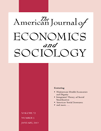
AMERICAN JOURNAL OF ECONOMICS AND SOCIOLOGY
Exploring the Intersection of Economics and Society.American Journal of Economics and Sociology is a distinguished peer-reviewed journal published by Wiley that serves as a vital platform for researchers and professionals in the fields of economics and sociology. With a publication history spanning from 1941 to the present, this journal covers a diverse range of topics, promoting interdisciplinary research and fostering a deeper understanding of social and economic phenomena. Although it operates on a traditional subscription model, its contributions are widely recognized, earning it an impactful position within the academic community, reflected in its current 2023 Scopus Rankings— positioned in the top quartile for Sociology and Political Science and notable recognition in Economics and Econometrics. The journal is based in the United Kingdom and aims to enhance discourse and collaboration across economic and sociological domains, making it an essential resource for students, educators, and policymakers alike.

MANCHESTER SCHOOL
Pioneering rigorous research for a dynamic economic landscape.MANCHESTER SCHOOL, published by WILEY, is a leading academic journal in the field of Economics and Econometrics, with a rich legacy dating back to 1930. This esteemed journal fosters scholarly discourse by providing a platform for high-quality research articles that cover a broad spectrum of economic theories, empirical studies, and methodological advancements. With an impact factor reflective of its relevance and rigor, MANCHESTER SCHOOL is ranked in the Q3 category in Economics and Econometrics and holds a Scopus rank of #447 out of 716, placing it in the 37th percentile. Researchers and practitioners alike can access a wealth of knowledge through its diverse range of articles, contributing significantly to the advancement of economic science. While it does not offer Open Access options, the journal maintains a commitment to accessibility by providing in-depth analyses and discussions that are crucial for understanding contemporary economic challenges. Based in the United Kingdom, MANCHESTER SCHOOL continues to uphold its standard of excellence well into 2024 and beyond.